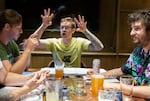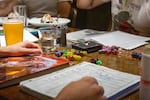When you hear the words Dungeons & Dragons, you may think of hit TV shows like “Stranger Things” or “The Big Bang Theory.” Maybe you played yourself as a kid, or play now as an adult. Or maybe you’ve never played, but listen or watch one of the hundreds of D&D podcasts or live streams featuring both celebrities and everyday players.
The fantasy role-playing game was co-created by Gary Gygax and Dave Arneson, and based loosely on a form of miniature wargaming that had become more popular in the 1950s and ’60s. Knowing he had a hit on his hands, Gygax took the idea for Dragons to Avalon Hill, the largest publisher of wargames and strategic board games at the time. But the company wasn’t interested, not being able to understand a game that had no winners or losers. So Gygax instead formed a company called Tactical Studies Rules to self-publish the game in 1974.
For years, the game sat somewhere on the fringes of pop culture, but in the late 80′s and early 90′s, the so-called “moral panic” helped fuel conspiracies that linked the game to everything from witchcraft to suicides to Satanism. By the mid-90′s, the controversies had manifested into rising sales of the game and Renton, Washington-based Wizards of the Coast started to take note. As the creators of Magic: The Gathering, the game publisher saw the potential for a cross-over audience and purchased TSR, Inc. in 1997.

Players pull out their dice in preparation for a game of Dungeons & Dragons. Its parent company, Wizards of the Coast, saw D&D sales jump 33% during the pandemic.
Hanin Najjar / OPB
Profits grew steadily over the next decade, but in the last five years revenue has nearly doubled.
“We’ve gone from about 480-ish million the first year I joined to last year, we were in the 820 million range is where we ended 2020,” said Chris Cocks, president of Wizards of the Coast.
And growth at Wizards of the Coast has continued into 2021. Operating profit and net revenues each grew 15% from the same quarter last year, with net revenue up more than $30 million dollars.
Cocks has been with the company since 2016 and came to the game publisher after more than a decade at Microsoft. But his introduction to D&D came long before that.
“I’ve been a fan of D&D and playing since I was a tween,” Cocks said.
“I went to my best friend’s house, Hans Schroeder, and his brother Thad introduced me to this really cool new game called Dungeons & Dragons,” he said. “I saw these old lead figures of wizards and fighters and dragons on his shelf. And he took me through my first game. I was able to roll up my first character, and from then on, I was in.”

Dungeon master Blake Hooper leads players in a game of Dungeons & Dragons at Mox Boarding House in Portland. The group records their game play for the Dice Boyz podcast.
Hanin Najjar / OPB
More story than game
With most games, the first question you’d probably ask is “How do you win?” But that’s not really applicable with Dungeons & Dragons since the game has no real end. When one quest wraps up, another one can start right away. This series of events creates an ongoing story called a “campaign.”
“This is going to be better if we think about this less as a game, like Monopoly say, where we’re each waiting to take our turn, and more as a story that we are all telling to each other,” said Blake Hooper, host and Dungeon Master for the D&D podcast Dice Boyz.
Hooper played only a handful of times as a kid, but it was enough to leave an impression.
“I still remember somebody trying to pull my character up on a rope. We were trying to scale this cliff, and the Dungeon Master had them roll the dice to see if they were able to see if they were strong enough to pull me up,” he said. “And they rolled a natural 20, which is the best thing that you can roll in the game.”
A natural 20, or “nat 20” for those in the know, is the highest roll on a 20-sided dice. Dungeons & Dragons uses various dice rolls to move the story forward and determine if an action succeeds or fails. The Dungeon Master is the game’s lead storyteller and referee, and a player’s dice rolls can determine everything from how charming their character can be to if they are strong enough to win in a confrontation.
D&D wasn’t really on Hooper’s radar again until it came up a few years ago during a monthly board game night with friends. By that point, Hooper was in his 30s and a new rule-set had been introduced for the game. These guidelines for the game cover everything from character customization to methods of play to philosophies of the game.
Past versions of Dungeons & Dragons were more board-game-centric, whereas the Fifth Edition ruleset relies more on the theater of the mind. Wizards of the Coast has also streamlined gameplay and created more opportunities for players to get creative.
Cocks described the Fifth Edition ruleset as “people forward, rules in the back.”
“I think the magic of the Fifth Edition is that the rules have basically been pushed way into the background and all you have to do is come to the table with a willingness to storytell with people and be a little silly,” he said. “And that’s a much smaller speed bump for people.”

Players at set up for a game of Dungeons & Dragons with dice sets, player sheets and player handbooks. The game uses various dice rolls to move the story forward and determine if an action succeeds or fails.
Hanin Najjar / OPB
From the outside, the game can seem intimidating with 300-page player handbooks, elaborate dice sets, and players who write their own campaigns from scratch (something people in the D&D world call “homebrew”). But you don’t actually need any of that to start a Dungeons & Dragons campaign.
“There’s a wide variety of digital tools that effectively make it free for you to roll up a character and start playing,” Cocks said.
And Cocks says the company has tried to make it as easy as possible for people to take up D&D.
“Things like the ‘Essentials Kit’ make it easier to learn how to DM and also easier to play with smaller groups of people, because not everyone can find like four or five people to be able to play with,” he said. “Sometimes you might have a mother and a son who want to play and pick something up. And how do you make that player experience fun, too?”
Released in 2019, the “Essentials Kit’' has everything a new player would need to start at a price point of around $25. Last year, sales of the kit skyrocketed 300%. Add nostalgia for the game from older Millennials and Gen-Xers now with kids of their own, and a pandemic forcing people away from bars, movie theaters and other outside-the-home activities, and last year was Wizards of the Coast’s best year ever.
Revenue for Wizards of the Coast grew 24% from 2019 to 2020 with D&D sales jumping 33% year-over-year. That’s even as its parent company, Hasbro, saw revenue fall slightly last year.
Playing the game and watching the game
The growth of Dungeons & Dragons also comes at a time when consumers seem hungrier than ever for content. The explosion of digital platforms, social media and streaming services make for the perfect vehicle for a game that’s less about winning or losing — and more about sharing a story.
Blake Hooper has been playing D&D for the last five years, becoming a dungeon master out of necessity to play with friends who were also newer to the game. But for the last three years, his group has also been recording their campaigns for the Dice Boyz podcast thanks, in part, to a Passion Project Grant from his former employer that went to purchasing recording equipment.
“Not only is [Dungeons & Dragons] a game that people play, it’s also a game that people listen to people playing, and it’s a game that people watch people playing,” Hooper said.

Lauren Lapkus joined other celebrities to play Dungeons & Dragons for the Wizards of the Coast annual charity event 'D & D LIVE'. Pictured with Jack Black, Kevin Smith, and Jason Mewes, they joined Tiffany Haddish and Reggie Watts in a campaign called "Lost Odyssey: Last Light" with Dungeon Master Kate Welch.
Screenshot G4TV YouTube / OPB
And just as in competitive eSports, podcasts and streaming can hold a major cachet when the people playing are celebrities, something Wizards of the Coast tapped into for their annual charity event called D & D LIVE.
This year, the company partnered with the rebooted gaming networked G4 and streamed four celebrity D&D sessions over a two-day event in July. The celebrity players were a mix of veteran players and newbies alike, including WWE Superstars Xavier Woods and Tyler Breeze, writer and director Kevin Smith and actors and comedians Jack Black, Patton Oswalt, Tiffany Haddish and Lauren Lapkus.
“D&D was something that I just knew about, but I never really understood what it was,” Lapkus said recently. “I didn’t understand if it was like a board game or even how it works. Like how do you determine how things happen? It was very mysterious to me.”
She had heard of Dungeons & Dragons, name-checking shows like “‘Freaks and Geeks” and “The Big Bang Theory,” which Lapkus was on for two seasons. But it was still on the periphery of pop culture for her until recently.
“During the pandemic, my husband got into playing with a group of his friends on Zoom and he would just be in there for hours, just like laughing, having the best time,” she said. “And truly it’s like something that’s so easy to dismiss and make fun of, but now that I’ve tried it it’s very fun. And then as an improviser, it falls right into all of those skills and it’s just like a fun adventure.”

Owner Matthew Mičetić stands in the new location for Red Castle Games. The Southeast Portland game store moved into the space during the pandemic, but only opened to in-store shopping this June.
Crystal Ligori / OPB
An entire industry
The resurgence of Dungeons & Dragons has also had a ripple effect on independent game stores as well.
“Five to six years ago, D & D would probably be 5% to 10% of our business,’' said Matthew Mičetić. “It’s easily 35% to 40% now.”
Mičetić is the owner of Red Castle Games, a staple in Portland’s gaming community for more than a decade. The game store moved into a brand new location on SE Foster during the pandemic, but only opened to in-store shopping this June.
He’s seen the growth of Dungeons & Dragons first hand, especially among the younger fanbase.
“It gives them agency to pursue things,” he said. “It’s a space where kids can explore their own mental development and not face repercussions or disciplinary action like you would in a classroom. If you do something wrong in a game, you might just lose some hit points or something. It’s a safe space where they can have those learning opportunities.”
Mičetić points to a recent campaign in which a group of kids, rather than go on a traditional adventure, went into town and each started their own business.
“There’s the classic group of kids who are in a dungeon, slaying a dragon, and here’s the group of kids that just want to provide services for other adventures and live vicariously through them,” he said. “It’s such a vast world they can create.”
For years, Red Castle Games has hosted Dungeons & Dragons summer camps and after-school programs. This year, they went all virtual via Zoom, which Mičetić thinks they will keep around even after the pandemic.
“For some people, it’s an easier way to access it, others that might have transportation issues,” he said. “I think we have one or two families from the east coast in our summer camps this year, which I don’t even know how they found out, but somehow they did and their kids are in it. And so that’s great!”
And accessibility is important, both from how you access playing the game, to the campaigns themselves. One of the newest Dungeons & Dragons books, Candlekeep Mysteries, includes a wheelchair-accessible adventure. Wizards of the Coast has also gone back and revamped classic campaigns, including Curse of Strahd and Tomb of Annihilation to remove racist language and real-world stereotypes.
It’s something Mičetić noticed and praised.
“As long as we from the bottom up and the top-down, keep working to make it so these games become more accessible for people, that they can see themselves in the game, I think it’ll be a continued success for everyone,” he said.
